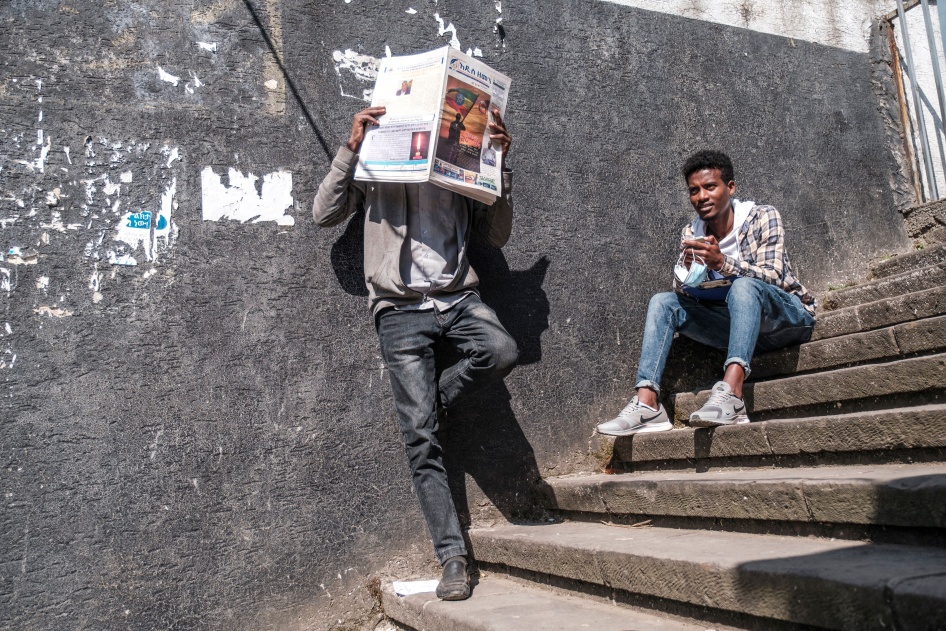(Nairobi) – Ethiopian authorities should immediately reverse the suspension of three independent human rights organizations and allow them to freely operate, Human Rights Watch said today. Ethiopia’s partners should publicly condemn the government’s latest attacks on civil society organizations.
Since November 14, 2024, the Ethiopian Authority for Civil Society Organizations (ACSO), a government body that oversees civil society groups, has issued suspension letters to the Center for the Advancement of Rights and Democracy (CARD), the Association for Human Rights in Ethiopia (AHRE), and Lawyers for Human Rights (LHR), forcing the organizations to cease their work. The letters alleged that the organizations were politically biased and engaged in activities that “undermined national interest.”
“Ethiopian authorities are squeezing shut whatever space remains for independent rights groups to operate in the country,” said Laetitia Bader, deputy Africa director at Human Rights Watch. “The government’s latest assault shows that Ethiopia remains among the most inhospitable places to criticize government actions and promote human rights.”
The three suspended organizations, which have been outspoken about governance, the rule of law, and rights abuses in Ethiopia, received the notices days after joining a public letter that criticized proposed amendments to the government’s media law. The amendments would roll back the institutional independence of the country’s media authority and bring it under the control of the Office of the Prime Minister.
CARD and AHRE responded that the ACSO did not follow required procedures under the 2019 Charities and Societies Proclamation, including by failing to provide prior written notice that the groups were not in compliance with the law. The two groups indicated they were engaging with the authority to reverse the decision. LHR stated that it would challenge the suspension through legal channels. In a November 28 press briefing, the deputy director of the government’s civil society authority stated that the authority would issue shortly a decision regarding the suspended organizations, adding that it was inappropriate to conclude that civil society space had narrowed.
Suspending the organizations reflects a much broader government effort in recent years to silence independent civil society groups, the media, and other critical voices to evade scrutiny, Human Rights Watch said. During unrest or conflict, government authorities have shut down the internet and access to telecommunications and carried out sweeping arrests against journalists and government critics, detaining people for prolonged periods without charge. In June, the Committee to Protect Journalists found that government harassment and persecution had forced at least 54 Ethiopian journalists and media workers into exile since 2020.
The government’s repressive tactics have also extended to international humanitarian organizations. In 2021, the civil society authority suspended the operations of the Norwegian Refugee Council, Médecins Sans Frontières (Doctors Without Borders), and Al Maktoume Foundation during the humanitarian crisis resulting from the Tigray conflict.
In September 2022, the civil society authority’s director general told state media that the agency would make organizations “working against Ethiopia’s sovereignty and public interest” accountable by law. The warning came after 35 civil society groups issued a public statement calling for peace in Ethiopia and an end to ongoing conflicts in the Tigray, Afar, Amhara, and Oromia regions after authorities blocked them from holding a media conference on the topic.
Earlier in 2024, Ethiopian security and intelligence forces followed staff members of prominent human rights organizations, including those now suspended, at their places of work and at home, and demanded that they stop their human rights reporting and work or face consequences. The continued threats and harassment forced some human rights defenders to suspend their work, censor themselves, or flee the country altogether.
The Ethiopian government’s actions mimic those of previous administrations, Human Rights Watch said. In the past decades, the Ethiopian government has enacted draconian laws that punished political speech and protests and shut down civil society groups and the media. The government of Prime Minister Abiy Ahmed, which took office in 2018, carried out reforms that repealed abusive laws.
In a November 26, 2024 post on Facebook, Abiy extolled his government’s reforms, including respect for media freedom, the increased registration of nongovernmental organizations, and the important role that civil society plays in political and social life. However, the prime minister’s statement ignored the government’s concerted efforts to evade scrutiny, silence its critics, and roll back recent reforms, Human Rights Watch said.
Ethiopian authorities should immediately reverse the suspension of the groups, end the escalating crackdown, and allow civil society organizations to freely carry out their human rights work, Human Rights Watch said.
Few avenues currently exist for international scrutiny of the government’s abusive actions, including serious conflict-related violations. In June 2023, the African Commission on Human and Peoples’ Rights quietly terminated the Commission of Inquiry on the human rights situation in Tigray, and in September 2023, Ethiopia’s international partners, including the European Union and its members on the United Nations Human Rights Council, failed to renew the UN expert inquiry on Ethiopia.
With shrinking space domestically for rights groups, Ethiopia’s regional and international partners should take a firm stance against the government’s attempts to curtail fundamental rights.
Ethiopia’s partners have a critical window to step up and tie their relationship with Ethiopia to tangible benchmarks and indicators on human rights and accountability, including urgently demanding the government reverse the decision to suspend the three organizations, Human Rights Watch said.
Given the failure to ensure accountability for past and ongoing violations and the increased crackdown on rights, the UN Office of the High Commissioner for Human Rights should increase its scrutiny and regularly and publicly report on the deteriorating situation. UN member states should also raise their human rights concerns directly with the Ethiopian authorities and in their interventions at the UN Human Rights Council and remain ready to bring the situation in Ethiopia back onto the council’s agenda.
“Concerned governments should not remain passive observers to Ethiopia’s deepening repression,” Bader said. “Swift condemnation and concrete pressure by regional and international partners are needed to deter and reverse further oppression.”








